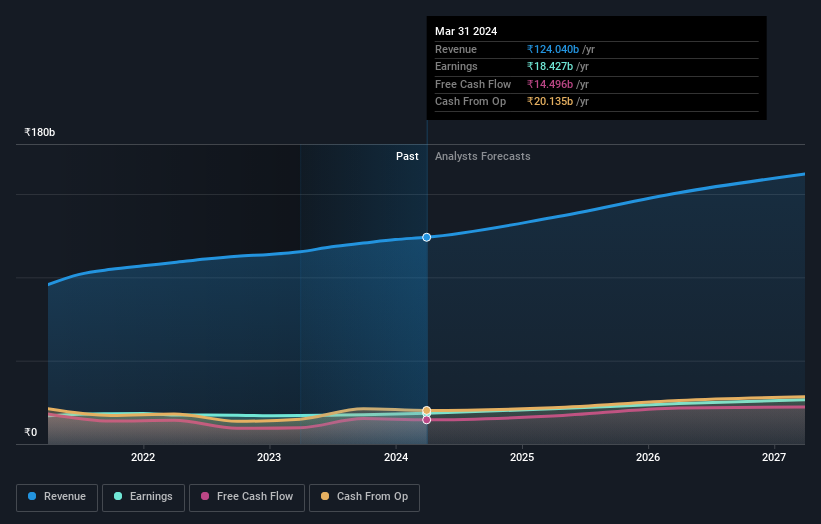- India
- /
- Personal Products
- /
- NSEI:DABUR
Dabur India Limited (NSE:DABUR) Yearly Results Just Came Out: Here's What Analysts Are Forecasting For This Year

Investors in Dabur India Limited (NSE:DABUR) had a good week, as its shares rose 4.5% to close at ₹532 following the release of its full-year results. Revenues of ₹124b were in line with forecasts, although statutory earnings per share (EPS) came in below expectations at ₹10.38, missing estimates by 3.9%. Earnings are an important time for investors, as they can track a company's performance, look at what the analysts are forecasting for next year, and see if there's been a change in sentiment towards the company. We've gathered the most recent statutory forecasts to see whether the analysts have changed their earnings models, following these results.
View our latest analysis for Dabur India

Taking into account the latest results, the current consensus from Dabur India's 35 analysts is for revenues of ₹135.9b in 2025. This would reflect a meaningful 9.6% increase on its revenue over the past 12 months. Per-share earnings are expected to expand 15% to ₹11.97. Before this earnings report, the analysts had been forecasting revenues of ₹137.9b and earnings per share (EPS) of ₹12.31 in 2025. The analysts seem to have become a little more negative on the business after the latest results, given the small dip in their earnings per share numbers for next year.
It might be a surprise to learn that the consensus price target was broadly unchanged at ₹601, with the analysts clearly implying that the forecast decline in earnings is not expected to have much of an impact on valuation. It could also be instructive to look at the range of analyst estimates, to evaluate how different the outlier opinions are from the mean. The most optimistic Dabur India analyst has a price target of ₹690 per share, while the most pessimistic values it at ₹500. There are definitely some different views on the stock, but the range of estimates is not wide enough as to imply that the situation is unforecastable, in our view.
These estimates are interesting, but it can be useful to paint some more broad strokes when seeing how forecasts compare, both to the Dabur India's past performance and to peers in the same industry. We can infer from the latest estimates that forecasts expect a continuation of Dabur India'shistorical trends, as the 9.6% annualised revenue growth to the end of 2025 is roughly in line with the 8.5% annual growth over the past five years. Juxtapose this against our data, which suggests that other companies (with analyst coverage) in the industry are forecast to see their revenues grow 7.7% per year. So although Dabur India is expected to maintain its revenue growth rate, it's only growing at about the rate of the wider industry.
The Bottom Line
The most important thing to take away is that the analysts downgraded their earnings per share estimates, showing that there has been a clear decline in sentiment following these results. Happily, there were no real changes to revenue forecasts, with the business still expected to grow in line with the overall industry. The consensus price target held steady at ₹601, with the latest estimates not enough to have an impact on their price targets.
Keeping that in mind, we still think that the longer term trajectory of the business is much more important for investors to consider. We have estimates - from multiple Dabur India analysts - going out to 2027, and you can see them free on our platform here.
However, before you get too enthused, we've discovered 1 warning sign for Dabur India that you should be aware of.
New: Manage All Your Stock Portfolios in One Place
We've created the ultimate portfolio companion for stock investors, and it's free.
• Connect an unlimited number of Portfolios and see your total in one currency
• Be alerted to new Warning Signs or Risks via email or mobile
• Track the Fair Value of your stocks
Have feedback on this article? Concerned about the content? Get in touch with us directly. Alternatively, email editorial-team (at) simplywallst.com.
This article by Simply Wall St is general in nature. We provide commentary based on historical data and analyst forecasts only using an unbiased methodology and our articles are not intended to be financial advice. It does not constitute a recommendation to buy or sell any stock, and does not take account of your objectives, or your financial situation. We aim to bring you long-term focused analysis driven by fundamental data. Note that our analysis may not factor in the latest price-sensitive company announcements or qualitative material. Simply Wall St has no position in any stocks mentioned.
About NSEI:DABUR
Excellent balance sheet average dividend payer.
Similar Companies
Market Insights
Community Narratives



